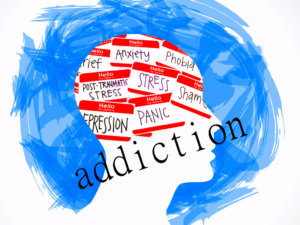
Side Effects of Alcoholism: Mental, Physical, and Social – Consuming too much alcohol, whether on isolated occasions or consistently over time can take a serious toll on your mental and physical well-being – not to mention your social life, including interpersonal relationships, finances, and criminal record.
The following is a comprehensive, but not an all-inclusive list of the possible adverse repercussions in all areas of life…
Side Effects of Alcohol: Mental and Emotional Health
Excess alcohol consumption negatively affects memory and learning functions – in particular, the association between alcoholism and mental health appears to impact a person’s ability to retain new memories. While both female and male alcoholics tend to suffer from similar learning and memory problems, women appear to be especially affected.
Also, alcoholics often suffer from diffuse brain damage in multiple areas simultaneously – according to research the prefrontal cortex especially is vulnerable to the impact of substance abuse, because it is connected to every lobe of the brain. Moreover, as the prefrontal cortex regulates “executive control” – planning, goals, and judgment – alcoholics put themselves at a heightened risk for a wide variety of cognitive, behavioral, and emotional issues.
Finally, alcoholism and depression tend to go hand-in-hand, and consuming alcohol excessively is linked to a myriad of adverse emotional states, such as depression and anxiety. Whether alcoholism causes depression or anxiety is up for debate – but certainly, it does appear to exacerbate it.
Side Effects of Alcoholism: Physical
The Brain

Brain function is placed firmly between the physical and mental effects of alcoholism – indeed, alcoholism impedes the communication pathways of the brain and can impact its structure and function. These disruptions can alter mood and behavior, and make it more challenging to think clearly and move with optimal coordination.
The Heart
Drinking excessively over time or even too much on an isolated occasion can cause damage to the heart, and result in problems including cardiomyopathy, arrhythmia (irregular heartbeat), stroke, and hypertension (high blood pressure.)
The Liver
Alcoholism can take a terrible toll on the liver, and result in many problems including fatty liver, alcoholic hepatitis, fibrosis, and cirrhosis. Also, consuming too much alcohol at one time, especially given the subpar condition of one’s liver can result in acute liver failure.
The Pancreas
Alcohol use causes the pancreas to create toxic substances that can eventually result in pancreatitis, which is characterized by dangerous edema and inflammation of the blood vessels in the pancreas that impedes proper digestion.
Immune System
Consuming an excessive amount of alcohol can impair the immune system, and therefore, chronic drinkers are more susceptible to disease. Long-term alcoholics are more apt to suffer from diseases such as pneumonia and tuberculosis than others who drink occasionally or not at all.
Cancer
Based on extensive research, there appears to be a solid scientific consensus that a link exists between alcoholism and several types of cancer. In fact, the National Toxicology Program of the U.S. Department of Health and Human Services classifies the consumption of alcohol as a human carcinogen.
Evidence shows that the more alcohol a person consumes (particularly over time) the higher the risk of developing cancer associated with alcohol use. According to data from 2009, around 3.5% of all cancer deaths in the U.S. (approximately 19,500) were alcohol-related.
Clear patterns have emerged between alcohol use and the development of the following types of cancer:
Cancer of the Head and Neck
Alcohol consumption is a significant risk factor for some head and neck cancers, especially those of the oral cavity (e.g., mouth, pharynx and larynx.) Persons who drink more than 3.5 drinks per day have at least two times higher risk of developing these cancers than non-drinkers.
Esophageal Cancer
Alcohol use is also a major risk factor for esophageal squamous cell carcinoma, and people who inherit a deficiency in an enzyme that breaks down alcohol have been found to have a significantly higher risk of alcohol-related esophageal squamous cell carcinoma.
Liver Cancer
Alcohol consumption is a primary cause of hepatocellular carcinoma or liver cancer. The other major causes are chronic infections of the hepatitis B or hepatitis C virus.
Breast cancer
Over 100 studies have examined the link between alcohol use and the risk of female breast cancer. This research has consistently revealed an increased risk of breast cancer related to increased alcohol consumption.
An analysis of more than half of these studies showed that women who consumed more than 45 grams of alcohol each day (around three drinks) had a 1.5 times greater risk (a modestly increased risk) of developing breast cancer than non-drinkers.
Colorectal Cancer
Alcohol use is also linked to a modestly increased risk of colon and rectum cancers. An analysis of dozens of studies that looked at the association between alcohol consumption and colorectal cancer risk revealed that persons who regularly drank 50 or more grams of alcohol each day had 1.5 times the risk of developing colorectal cancer versus non-drinkers or infrequent drinkers.
Side Effects of Alcoholism: Social

Many alcoholics start to withdraw from society, spending less time participating in activities they once enjoyed and less time interacting with friends and family. They may even develop a new social circle of friends, preferring to spend time with other heavy drinkers. Or, they may be solitary drinkers, further isolating themselves from society.
Alcoholism – also known as alcohol use disorder – has a ripple effect – it begins by affecting those closest to the alcoholic, and continues to spread outward into far-reaching areas. For family members and close friends, loving an alcoholic is not easy. Effects may include, but are not limited to the following:
- Guilt or shame due to enabling the alcoholic’s drinking and behavior
- Blaming oneself for the actions/problems of the alcoholic
- Embarrassment over the alcoholic’s behavior
- Fear that alcoholic will hurt themselves or someone else
- Picking up the slack in responsibilities of the alcoholic, which sometimes means children must act as the parent (e.g., babysit the alcoholic or take care of other siblings)
- Stress over arguments/altercations with the alcoholic when intoxicated
- Mental and physical abuse suffered at the hands of the alcoholic when intoxicated
- Turning to drugs or alcohol oneself as a coping mechanism
Alcohol addiction not only affects the alcohol and their loved ones, but there are also consequences for anyone they encounter including neighbors and co-workers. Each year, alcohol abuse results in increased expenses for the criminal justice system and law enforcement, decreased work productivity and increased costs related to physical and mental health care.
Alcoholism affects almost every aspect of society including:
- Higher incidence of DUI related accidents
- Increased traffic fatalities
- Public and private property damage
- Higher insurance premiums
- A decline in health and development of chronic health conditions
- Increased medical claims
- A decrease in workplace productivity
- Increase in work-related accidents
- Domestic violence
- Violent crimes
Treatment for Alcoholism

Alcoholism is a longstanding disease but can be effectively treated using a combination of therapeutic approaches, including behavioral therapy, counseling, 12-step meeting participation, group support, and complimentary, holistic practices such as yoga and meditation.
Our center offers evidence-based in partial hospitalization and intensive outpatient formats. Our medical and mental health staff have expertise in addiction and help provide patients with the tools they need to recover and maintain consistent, ongoing sobriety.
If you or your loved one is suffering from alcohol abuse, please seek help as soon as possible.